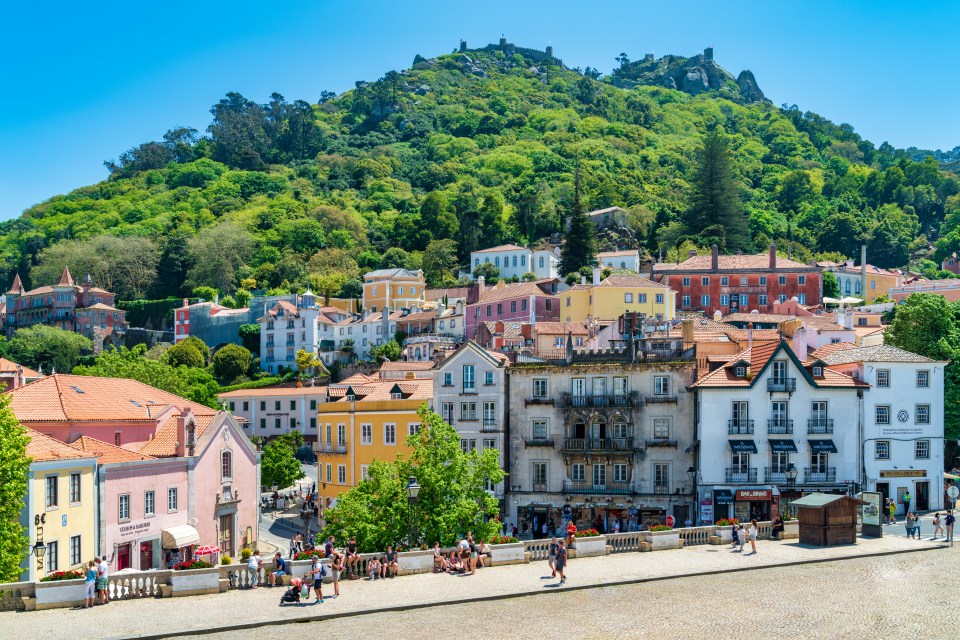LOCALS in Europe are raging at tourists who they say are turning their homes into “amusement parks”.
The Portuguese town of Sintra has become a boiling point of fury where residents say “guerrilla action is needed” to rid the area of holidaymakers.
Portuguese village of Sintra, where locals are raging about the number of tourists visiting
GettyTourists take selfies in Sintra, Portugal[/caption]
AFPTourists in the village of Oia on the Greek island of Santorini – where locals were told to stay at home to make room for holidaymakers[/caption]
EPAPeople protesting against tourists in the Canary Islands[/caption]
They’re claiming the world heritage site has been turned into “a mere congested amusement park”.
Some of them say tourists are the cause of “traffic chaos” in the town centre with cars left parked haphazardly on the streets.
Tiny one-way medieval roads are filled with drivers heading in the wrong direction and poor knowledge of the rules has led to crashes.
Sintra’s locals, the latest across Europe to jump on a growing anti-tourist bandwagon, has sparked a “tourist hell”.
The resort town, not far from capital Lisbon, is home to a series of historic villas and palaces that people flock from around the world to visit.
One Brit living in Sintra, Sarah Hemmings, told The Times: “It’s very frightening thinking [what would happen] if there was a fire or an emergency and an ambulance needed to get through.
“It takes me two to three hours to do a 20-minute round trip from my house to the nearest shop.
“Residents are basically trapped in their houses during the day because of the traffic. It’s very badly managed — also an awful experience for visitors.”
While it is not clear what the “guerrilla action” one resident bid for could entail, protestors there are asking for better protections for local environment and “for permanent rentals to be encouraged”.
Anger in Sintra follows waves of anti-tourist movements across other holiday hotspots in recent months, in Spain, Greece, the Canary Islands and Italy.
This week officials on the idyllic Greek island of Santorini, a wildly popular holiday spot, a lockdown was briefly imposed on locals to make enough space for tourists.
In a now deleted Facebook post, Santorini’s city council called on residents to stay at home wherever possible, Bild reports.
It came after 11,000 holidaymakers arrived via cruise in just one day, Ekathimerini reports.
Spain has been a major focal point for raging residents who have even plastered towns with graffiti telling holidaymakers to “go home”.
A few weeks ago almost 3,000 protestors took to the streets of Spain’s capital Barcelona and used water guns to attack tourists.
Some 2,800 locals marched along a waterfront district of the city with their furious slogan “Enough! Let’s put limits on tourism”, plastered across banners and signs.
Two women were seen pointing their water pistols at tourists with stern looks on their faces.
Some unlucky holidaymakers were sprayed as they tried to enjoy their evening, with some eating their dinner outdoors at restaurants.
Footage then captured tourists fleeing from the spray.
Protesters organised another huge demonstration in Majorca only days ago where they chanted: “We will plough the highways, the hotels will be empty and so the world will understand that there are too many tourists.”
Another said: “Goodbye rental cars, goodbye rat businesses. Houses will be cheap and we won’t see more cyclists.”
Reasons for the protests across Europe are largely the same – issues of overcrowding, housing, protecting the environment, congestion and resource allocation.
Residents across the board feel pushed out by mass tourism – and are concerned about the preservation of their beaches or beauty spots.
But the tourism industry, which rakes in billions across the globe every year, is responsible for keeping many of those towns and villages afloat.
Business owners, politicians, hotel bosses and restaurateurs have expressed concern about the growing movement and what might happen if tourists stop visiting.
Anti-tourist measures sweeping hotspots
A WAVE of anti-tourist measures are being implemented across Europe to curb mass tourism in popular holiday hotspots.
Overcrowding has become the main problem in many sunny destinations, with authorities trying to find a solution to keep tourists and locals happy.
Officials have attempted to reduce the impact of holidaymakers by implementing additional taxes on tourists, or banning new hotels.
Earlier this year Venice became the first city in the world to charge an entry fee for holidaymakers after it started charging day-trippers €5 (£4.30) if visiting the historical Italian centre.
It was followed by an area in Barcelona which resorted to removing a well-used bus route from Apple and Google Maps to stop crowds of tourists from using the bus.
Meanwhile, San Sebastián in the north of Spain, limited the maximum number of people on guided visits to 25 to avoid congestion, noise, nuisance and overcrowding.
The city has already banned the construction of new hotels.
The Spanish government has allowed restaurants to charge customers more for sitting in the shade in Andalucia.
Benidorm has introduced time restrictions, as swimming in the sea between midnight and 7am could cost a whopping £1,000.
The Canary Islands are also considering adopting measures to regulate the number of visitors – and charge tourists a daily tax.
Greece has already enforced a tourist tax during the high season (from March to October) with visitors expected to pay from €1 (£0.86) to €4 (£3.45) per night, depending on the booked accommodation.
Officials in Santiago de Compostela in Galicia want to introduce a fee for travellers to remind people to be courteous during their trips.
11,000 tourists arrive via cruise to Santorini in one day
Locals spray tourists with water guns in Barcelona, early July
Residents across Europe have protested with signs bearing slogans like ‘Tourists go home’
Thousands protesting against holidaymakers in Barcelona, Spain

